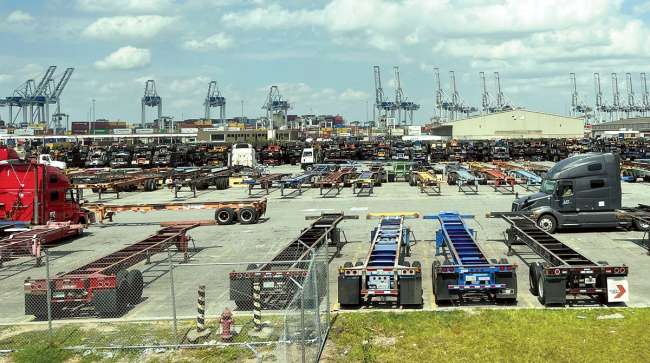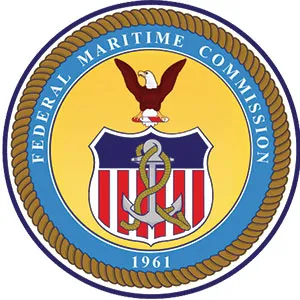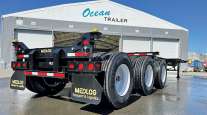Staff Reporter
Study: Tighter Intermodal Chassis Regulation Enforcement Needed

[Stay on top of transportation news: Get TTNews in your inbox.]
Policy changes would be an impractical solution to making the drayage and intermodal chassis market more efficient, according to a recently published study, but it would be beneficial if existing regulations were enforced more tightly, and more information shared.
That’s because the gap in inspection performance “appears to be about the same today as it was nearly 15 years ago when [the Federal Motor Carrier Safety Administration] introduced … new safety requirements for intermodal chassis,” the National Academies of Sciences, Engineering, and Medicine study concluded.
The supply chain optimization study was commissioned by the Federal Maritime Commission as a result of the Ocean Shipping Reform Act of 2022 after a Government Accountability Office report into port congestion and chassis safety.

What should happen, the study recommended, is the FMCSA drilling down into inspection records to ensure safety standards are being met; and if the results determine monitoring is not tight enough, reassess the processes; FMC and FMCSA should work together to increase chassis quality monitoring; and FMC should ramp up data sharing.
The committee that produced the study recommended improvements to the visibility and forecasting of container traffic activity up and down the supply chain, but particularly to the benefit of intermodal carriers.
American Trucking Associations’ Intermodal Motor Carriers Conference Executive Director Jonathan Eisen hailed the recommendations.

Eisen
“The recommendations were certainly welcome from our point of view,” Eisen said. “Safety and maintenance of chassis has been a long-term problem, and our members are the ones that pay the price. Ensuring chassis are in good working order is a critical part of our members’ business.”
North America Chassis Pool Cooperative — a group of carriers consisting of Intermodal Cartage Co., Triple G Express, Eagle Systems, Devine Intermodal, Ability Tri-Modal Transportation Services and Farruggio’s Express — that supplies and leases chassis also welcomed the study’s findings.
“The study recommendations focused primarily on efforts that will increase the safety of chassis throughout the supply chain. This has been an absolute priority for NACPC and was in fact one of the reasons we were created,” Dave Manning, CEO of NACPC and a former ATA chairman, said in an email.

Manning
“We welcome these recommendations and are happy to work with the FMC and FMCSA as they examine the study’s conclusions and consider what action they may want to take,” he added.
Industry reaction was not 100% glowing though.
IMC Logistics Chief Commercial Officer Donna Lemm gave the study a mixed review.
Collierville, Tenn.-based intermodal carrier IMC — which ranks No. 5 on the Transport Topics intermodal and drayage carriers list — supports the recommendation that FMCSA undertake a comprehensive analysis of roadside inspection records to make sure intermodal chassis are meeting safety standards, but recommendations on best practices also should have been offered.
“The study references a goal of meeting the beneficial cargo owners’ objectives, but loses sight of the ultimate goal that best chassis practices enhance the success of the flow for all supply chain stakeholders, including motor carriers, railroads, ocean carriers and our import/export shippers. We are a freight system, and chassis are a critical link to successful commerce,” Lemm told TT in an email.

Lemm
Lemm added that while she hopes the study recognizing mismatches of chassis without heeding merchant or carrier haulage terms, known as box rules, will have an impact, that might not necessarily be the case.
FMC in February upheld a ruling by an administrative law judge that ocean carriers violated federal law by requiring trucking companies to use specific intermodal chassis providers when moving containers in and out of ports or moving them on trucks or rail to a destination.
FMC launched a follow-up investigation in June as chassis providers were reported to be failing to comply with a cease-and-desist order after the February decision.
“The study offers highlights of the operational challenges, especially at wheeled facilities including mismatches of chassis, driver time wasted at a wheeled facility trying to get a flip, the additional extra chassis split costs,” Lemm told TT.
“My hope is that given the study, Wikipedia can pick up the definition of box rules so clearly written by the Academies of Sciences, so those that Google [the term] can know what box rules means,” she said.
McLeod Software CEO Tom McLeod explores the potential for artificial intelligence to boost efficiency and build resilience. Tune in above or by going to RoadSigns.ttnews.com.
“Even though the ALJ ruling has affirmed the illegality of box rules as an unreasonable practice, the [academies capture] today’s practices at wheeled facilities, and I am still left wondering when it is going to cease and desist?” she concluded.
IMC filed a complaint against Ocean Carrier Equipment Management Association — a U.S.-based coalition of 10 major ocean common carriers; Consolidated Chassis Management and a number of other ocean carriers at FMC in 2020, alleging they were denying motor carriers the opportunity to choose a provider when leasing chassis, among other things. The complaint led to the ALJ ruling that FMC upheld.
OCEMA and CCM were not immediately available for comment on the study’s findings.
Want more news? Listen to today's daily briefing below or go here for more info:





